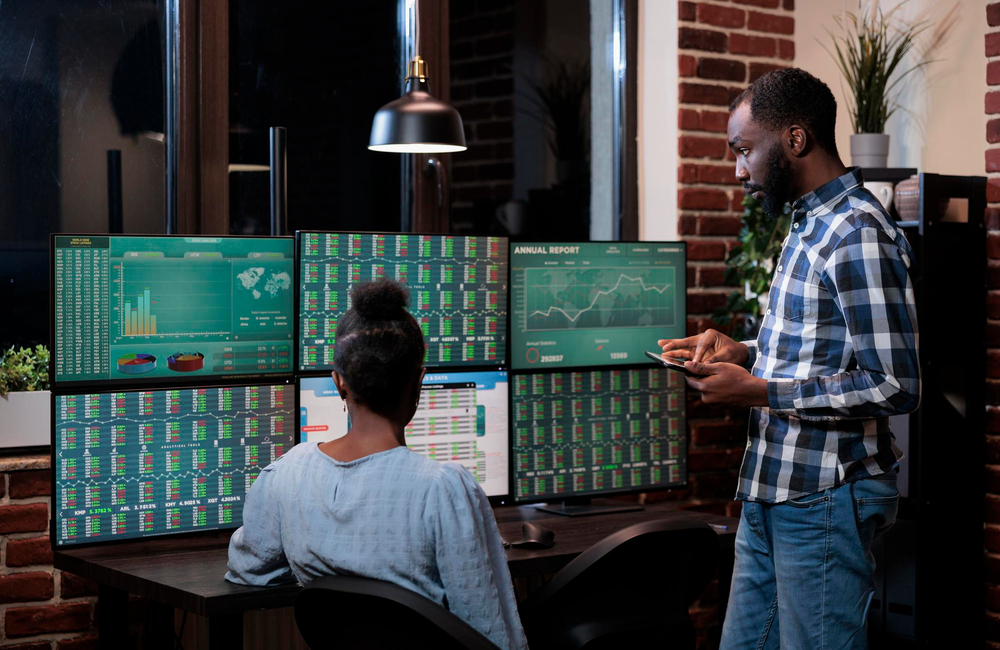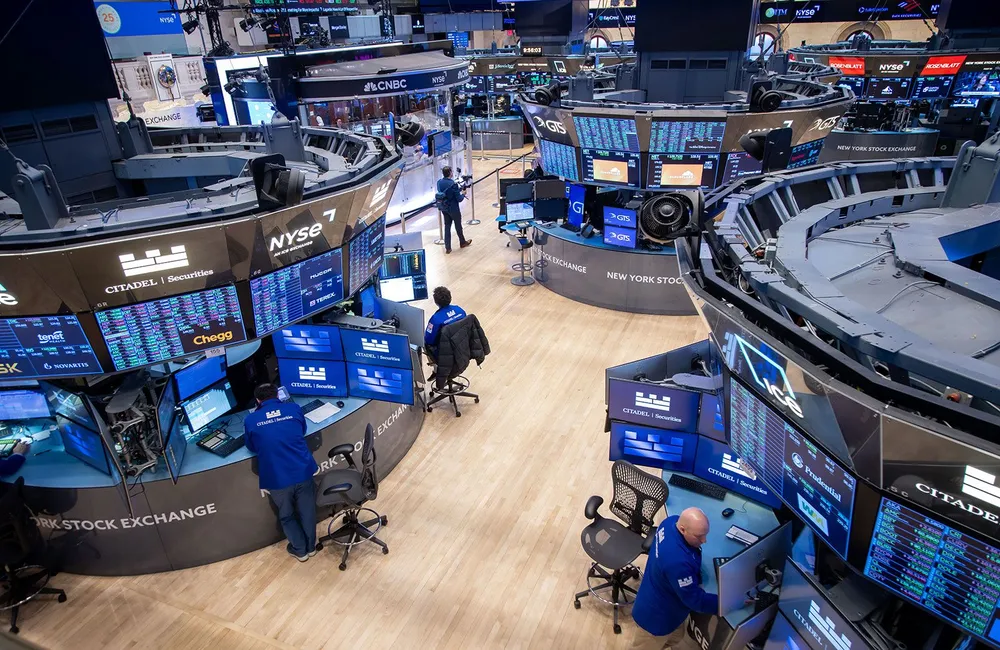ASX futures rose 80 points, or 1.1 per cent, to 7316 by 8.00 am AEST, indicating an early positive trading albeit a headwind following the sell off on Wall St.
The S&P 500 dipped 1.94 points, or less than 0.1 percent, at the end of trading on Monday. Commentary from the US Treasury, behind a spike in yields to their highest level since May 2019. Yields rise as prices fall. The tech-heavy Nasdaq Composite Index fell 0.4%, and the Dow Jones Industrial Average dropped 0.6%.
The US Federal Reserve’s is launching its mission to bring down decades-high inflation as a wide commodity price shock feeds fears of a growth slowdown. Brent Crude oil moved higher once again overnight, but is still above highs notched in early March. Chair Powell, in comments on Monday, said the bank stands prepared to hike rates in 0.5% increments if necessary to fight inflation. Last week, the Fed increased rates for the first time since 2018.
“There’s a belief that investors are reading Powell’s transparency as a further step to say, ‘He’s just getting us ready for the worst,’” said Shannon Saccocia, chief investment officer at Boston Private. “Wherein, the bond market is looking at him and saying, ‘No, no, he is telling you he is going to do at least seven [rate increases], and you are not listening.’”
Locally, the S&P/ASX 200 index lost 0.2% to 7278.5 on Monday, surrendering earlier gains to snap a three-day string of stronger closes. Industrials dropped 1.2% and health care companies lost 1%, while information-technology shares gained 2.5% and utilities were up 0.8%.
Among the worst hit on Monday was Magellan Financial Group, which fell over 4% to A$15.06/share after its co-founder Hamish Douglass resigned from the firm’s board on a medical leave of absence, raising questions about the company’s leadership in the near-term.
The war in Ukraine has pushed commodities prices sharply higher and helped accelerate inflation, leading investors to take a risk-off stance and sell down global banks sharply. But investment bank Citi points out Australian banks have unexpectedly gone against the trend.
“We think it’s owing to an Australian commodities dependent economy, an accelerating inflation and rates story and solid capital adequacy and non-performing loans combination,” Citi says.
In the commodities market, iron ore dipped 2.3% to US$147.90 a tonne; Brent Crude surged 8.1% to US$116.68; and gold futures increased 0.05% to US$1934.80.
Hawkish comments from Fed Chairman Powell led to a sharp sell off in bond markets while yields on the US 10-Year Treasury Note also soared to 2.29%. The yield on Australia’s 10-year bond was unchanged at 2.57%. Yields rise when prices fall.
The Australian softened to 73.96 U. 00am AEST, compared with the previous close of 74.12. The WSJ Dollar Index, which measures the US dollar against 16 others, edged up to 91.26.
Asia
Chinese stocks ended higher, continuing a recovery that began last week, and on signs US-China tensions over the Russian invasion of Ukraine were easing. The benchmark Shanghai Composite Index gained 0.1% and the Shenzhen Composite Index added 0.7%. The tech-heavy ChiNext Price Index increased by 0.5%. Drug makers drove much of the rebound as the sector added on to Friday’s surge, after multiple Chinese pharmaceutical companies were granted licenses to develop generic versions of Pfizer’s oral Covid-19 drug nirmatrelvir. Shares in Shanghai Fosun Pharmaceutical, one of a handful of companies with the special licenses, jumped 10%, their daily rise limit.
In Hong Kong, the Hang Seng Index wiped out early in-the-black moves and finished 0.9% lower on profit taking, meanwhile, according to KGI Securities. Investors are likely to continue focusing on companies reporting financial results this week, the brokerage added. The Hang Seng Tech Index also reversed early gains to fall 1.5%. Haidilao International lost 8.1%, while delivery firm Meituan dipped 6.1%. Shares related to property also fell. Country Garden Services dropped 5.8% and Country Garden Holdings finished 6.2% down. Among gainers, ENN Energy climbed 12% after announcing 2021 net profit.
Japanese share markets were shut for a public holiday.
Europe
European markets ended mixed, US stocks headed down and Ukraine remained a prevalent worry along with comments about the economy from the US Federal Reserve. The pan-European Stoxx Europe 600 was little changed.
In London, the FTSE 100 gained 0.51 percent on Monday, as higher commodity prices lifted oil and mining stocks.
“The drumbeat of conflict in Ukraine means that there is a solid foundation beneath commodity prices to continue rising, which helps propel the FTSE 100 when other indices struggled for direction in early trading,” IG Group PLC chief market analyst Chris Beauchamp says.
A jump in stock prices last week could still falter though, with little major news on tap this week. Earnings season is the next big test for stocks and while it’s too soon to get a feel for how the war is affecting earnings there could be some inklings of the future, Mr. Beauchamp says.
Russia’s stock market is still closed, but trading in Russia’s local-currency government bonds reopened on Monday. The central bank of Russia announced that it would buy government bonds. The Moscow Exchange, she said last week, would open gradually but with no specifics except for the bond purchases.
The Egyptian pound declined more than 13 percent against the dollar on Monday after Egypt’s central bank increased its key interest rate following a meeting of policy makers brought forward by three days, saying in a statement that it had reacted to increased inflation pressures it sees in the wake of Russia’s invasion of Ukraine.
As in many other countries in Africa, Egypt has depended on imports of wheat from Ukraine and Russia. Between 2018 and 2020, the United Nations reported, over 80% of its wheat imports were from the warring nations.
North America
Investors sold US stocks and government debt after Federal Reserve Chairman Jerome Powell reiterated the Fed’s commitment to controlling inflation with a rapid sequence of interest-rate increases.
The S&P 500 dipped 1.94 points, or less than 0.1%, on Monday’s close after Mr. Powell discussed the potential for more-aggressive interest-rate moves to bring inflation under control. Treasury yields climbed after he spoke, hitting their highest point since May 2019.
The tech-heavy Nasdaq Composite Index fell 0.4% and the Dow Jones Industrial Average fell 0.6%. U.S. stock indexes on Friday completed their strongest week since November 2020.
Shares of Boeing dropped $6.93, or 3.6 percent, to $185.90 after a Boeing 737 passenger jet operated by China Eastern Airlines with over 130 people on board crashed in southern China.
Mr. Powell, speaking at the National Association for Business Economics, reiterated that the US central bank stood ready to lift interest rates in half-percentage-point increments and to a sufficiently high level to intentionally slow the economy if necessary.
“Investors are interpreting that transparency from Powell as doing more to say ‘He’s simply getting us ready for the worst,’” said Shannon Saccocia, chief investment officer at Boston Private. “Whereas, the bond market is saying, ‘No, no, he’s telling you he’s going to do at least seven [rate hikes], and you aren’t listening.’”
The yield on the benchmark 10-year Treasury note increased to 2.294%. (This is an inverse relationship; yields grow when prices fall.) At the same time, investors have been anticipating further interest-rate increases from the Fed this year as the central bank works to cool price gains that are running at their fastest levels in 40 years. Higher yields could dampen demand from investors for riskier assets, analysts say.
“I wouldn’t say bonds look like a phenomenal investment now, but they are a lot more balanced than they were earlier into the year,” said Matt Dmytryszyn, chief investment officer at Telemus.
The war in Ukraine has increased volatility in stocks, bonds, commodities and currencies as investors scramble to figure out how widespread the economic impact of sanctions will be and how much they will disrupt supply chains. Investors are watching to see how the situation plays out, and if a resolution can be found soon.
“This is the key driver for markets in the next couple of days, or maybe weeks — it’s all about all that comes out of the Ukraine conflict,” said Carsten Brzeski, global head of macro research at ING Groep.
In individual stocks, Shares of Nielsen Holdings fell $1.68, or 6.9%, to $22.76 after the company rejected a $9 billion takeover offer from a private-equity consortium, saying that the bid undervalued the TV-ratings company. Insurer Alleghany Corp., which agreed to a deal to be purchased by Berkshire Hathaway for roughly $11.6 billion in cash, saw its stock jump $167.85, or 25%, to $844.60.
Brent-crude futures, the global benchmark, rose by $7.69 a barrel, or 7.1%, to $115.62. West Texas Intermediate futures, their U.S. counterpart, were up $7.42 a barrel, or 7.1 percent, at $112.12. Eight of the S&P 500’s 11 sectors dropped Monday; one of the few sectors to rise was energy, with a 3.8% gain. Occidental Petroleum rose $4.72, or 8.4 percent, to $60.96; Hess climbed $6.44, or 6.1 percent, to $103.85; and ExxonMobil was up $3.53, or 4.5 percent, to $82.20.
Higher oil prices have raised fears of sustained high inflation and lower growth in the US and Europe as gas and energy prices chomp through household budgets for other goods and services.
Many in the European Union are still considering an E.U.-wide ban on purchasing Russian oil, and could also send prices even higher, according to diplomats involved in that discussion. Russia’s invasion of Ukraine has placed a spotlight on Europe’s dependence on Russian energy, with Germany getting more than half its gas from Russia.
“There is this increasing realization that a couple of supply chains may cease to exist permanently. Energy prices, whatever the outcome of the war, will remain high,” Mr. Brzeski said.





















